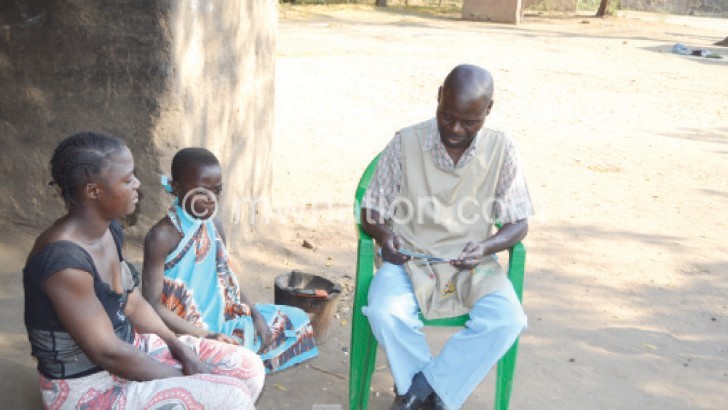Saving children in Malawi’s birthplace of cholera
Malawi is currently facing a cholera outbreak. This is the latest in a series of cholera outbreaks across the country, caused by unsafe water sources and poor hygiene practices. Unicef’s REBECCA PHWITIKO travelled to Chikwawa and Nsanje districts to appreciate the situation and reports.
Along the borders of Malawi and Mozambique in Traditional Authority (T/A) Ndamera in Nsanje lives Joyce Binda, 28, a mother of two—seven-year-old James and two-year-old Ethel.
She buys fish from fishers at a nearby marsh and resells them at her local market. Her husband, Steven, is a welder. Last year, they both suffered from cholera. Joyce spent three days in a cholera treatment camp at Ndamera Health Centre.
There are no euphemisms among the Sena. They hold back no word.

“It is not like other kinds of diarrhoea where you decide you need to go to the toilet and then go. With cholera, you don’t even decide, it does and you just realise after it has happened,” she explains.
Another cholera victim is 10-year-old Mary Mankhamba. Hers was the last cholera case recorded in 2017 in Nsanje. She was in hospital for two days, but went straight to school the day she was discharged because she did not want to miss her end-of-term examinations. When she grows up, Mary wants to be a medical doctor.
Mary’s mother, Patricia, says it was scary when her daughter got sick. She now insists that Mary and her brother Moses wash their hands with soap, and ensure the water they get from the borehole is well covered.
“We have learnt to be extra careful these days,” she says.
“Our village health worker, Mr Chagwa, gives us water guard every two weeks to treat the water.”
Nsanje district environmental health officer Fred Minyiliwa says cholera figures increase in years of heavy flooding. He adds that proximity to Mozambique means that some, if not most, of the cholera cases come from across the border.
“Out of the 19 cases registered in Nsanje between July 2016 and June 2017, five were Mozambicans,” Minyiliwa explains. “Further investigations also revealed that some of the other patients had had contact with people from across the border.”
Cholera preparedness and response strategy was developed jointly by the Ministry of Health, World Health Organisation (WHO) and Unicef with funding from UK Aid. The Nsanje District Health Office is well equipped to deal with any cholera outbreak.
The response unfolds like a well-rehearsed play. When a cholera case is suspected and eventually confirmed, a number of activities are set in motion. Everyone knows what needs to be done at each step.
The district mobilises health personnel and water experts to investigate the origin of the infection. They visit the patient, record their history, interview family members and trace the patient’s movements for five days before the onset of cholera. Health surveillance assistants (HSAs) disinfect the patient’s home with chlorine.
The team also assesses the sanitation situation in the home, checking the water source, availability and state of latrine, handwashing facilities, garbage disposal, and drying racks for cooking and eating utensils. They disinfect the surrounding area, support safe water for households by distributing water filters and chlorine, and train local communities in good hygiene.
Preparation, early warning and planning
While there is a frenzy of activity to respond to a cholera case, there is also systematic planning behind the scenes to prevent an outbreak and prepare for any cases that may come up. Routine surveillance is ongoing in the area. HSAs track and monitor the prevalence of diarrhoea in their catchment areas.
They are a key part of the social mobilisation effort to ensure communities are aware of the danger of cholera and know how to prevent its transmission.
Fanuel Gonya has been an HSA since 1995. He teaches communities to keep their homes cholera-free through good hygiene practices.
“Cholera is like a sudden attack,” Gonya says. “If untreated one can die within four hours after the diarrhoea starts. Preventing cholera is very dependent on the behaviour of the people so we try to make them understand that and get them to change.”
Supporting Malawi
In 2015, Unicef supported a water quality assessment which revealed high levels of contaminated water in homes in Nsanje. Minyaliwa says this indicates that the risk of water contamination is highest at the household level.
“There is safe water in Nsanje, but contamination takes place in the home,” he says.
In the past, cholera was a seasonal occurrence, hitting mainly during the rainy season from November to March.
“Things have changed,” Minyiliwa adds. “Now cholera can hit on any day.”
As cholera spreads quickly, it is essential to have the right treatment available at all times. UK Aid, through Unicef has funded cholera preparedness, prevention and control activities in the affected districts.
It provided £1.75 million (approximately K1.8 billion) from November 2016 to October 2017 to support preparedness, prepositioning of supplies, case management, training of health staff, surveillance, monitoring, supervision, and purchase of medical and water, sanitation and hygiene supplies.
“This direct support to cholera-prone districts really is saving lives,” Unicef chief of health Rumishael Shoo says.
In Ndamera, more than 20 000 people in cholera hotspot villages received two rounds of oral cholera vaccine immunization in July 2017. This campaign was organised by the Ministry of Health and WHO and Unicef provided technical support, monitoring and supervision of campaign activities with funding from UK Aid.
The programme aims to build resilience, within both communities and institutions. Over 2 000 health staff in cholera prone districts have been trained to recognize the signs and symptoms of cholera, and treat and manage the disease in a way that saves lives and prevent the disease from spreading.
They are also able to undertake regular surveillance in the community and flag any trends of diarrhea.
“The communities are more empowered than before,” Unicef’s Shoo adds. n





